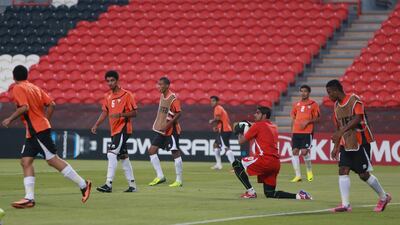Emboldened by recent performances and the conquests of previous generations, the UAE approach this Fifa Under 17 World Cup with an unbridled sense of daring.
“The players are not aiming just to participate but are striving for the maximum: to win the tournament,” said Rashid Amir, the side’s coach, during the summer. “The UAE will be a surprise in this tournament.
“They will surprise everybody.”
The Emirates have long conveyed a capacity to shock. While Italia 1990 remains the country’s only appearance on football’s grandest stage, notable success has been achieved at developmental level with titles gleaned and reputations burnished.
A not-too-distant Fifa World Cup appearance still fosters dreams and frames long-term policy, but there is a feeling that, for a country with a little more than eight million residents – of whom one million are citizens – the greatest opportunity to thrive, at present, lies in age-group tournaments.
There, the consensus implies, the gap that typically separates sides at senior level is not as wide.
It is a point stressed in the build-up to this month’s U17 World Cup, where the UAE share Group A with Honduras, Slovakia and Brazil, the three-time champions.
“Our view whenever the draw came out was that no group is easier than any other,” said Badr Ahmad Al Hammadi, the UAE team manager. “That’s because of the age group. I believe that, at 17, most of the players tend to be of similar standard.”
It is a theory not confined solely to this band of UAE teenagers.
Understandably, the UAE’s class of 1990 are still revered and respected, and there has been significant senior-team success on the continent, too, but the past decade has conjured considerable cause for celebration at various youth-team tournaments.
Quarter-final berths at the 2003 and 2009 Fifa U20 World Cups are striking highlights on the global stage, the UAE exceeding expectations.
Sandwiched between is that memorable U19 Asian Championship title in 2008; the first sign Mahdi Ali’s current “golden generation” were worthy of the name.
“Our win is a true reflection of the development in UAE football and, God willing, we will continue our march towards bigger success,” Mohammed Fawzi, the midfielder, said amid the jubilation.
Four years later, his prophecy was realised, as the UAE’s U23 team qualified for the 2012 London Olympics and took a lead against Uruguay, equalised in the second half against Great Britain and tied Senegal.
The effort brought only one point but new levels of respect.
“The whole Olympics was great,” said Omar Abdulrahman, the side’s standout. “We used to watch matches at Old Trafford and Wembley and dream we could some day reach a level where we played in those stadiums, too.
“That was a huge motivation for us and it made us feel we had the capability to be like any other national team.”
A swift climb through the Fifa world rankings suggests the UAE are growing ever more comfortable in their own skin. Now 82nd – their highest position since 2004 – the national team is reaping the rewards of steady development, made possible by the sustained support of the game’s governing body here.
“The UAE Football Association is focusing on every category of the national teams and obviously for one goal, which is to carry this talent and these players to the first team and build a better first team in the future,” Amir said.
“They’re doing a great job in providing everything needed, technical and everything else, to build these young players for the benefit of UAE football.”
Entrusted with the latest batch of prospective graduates, and invigorated by recent results and those who have gone before them, Amir’s bold pre-tournament prediction is perhaps not so implausible, after all.
jmcauley@thenational.ae
Follow us on twitter at @SprtNationalUAE
Download: Fifa U17 World Cup wall chart


